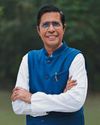
The more things change, the more they stay the same. The saying holds true in the case of plastic pollution for Supriya Sahu, an IAS officer. As a collector in early 2000, she successfully led a campaign for plastic-free Nilgiris district in Tamil Nadu. Today, more than two decades later, she is again leading the charge against plastic pollution in the entire state. In an interview with Rajiv Tikoo, she talks about what motivated her then, particularly in the absence of laws, and what keeps her going today with the help of technological innovations that can serve as examples for adoption by other states. Edited excerpts:
When you, as a collector, successfully led a campaign for plastic-free Nilgiris in early 2000, you were probably ahead of the times. What was the trigger?
Disturbing visuals of the post-mortem of cattle and elephants, establishing the bitter fact that animals were feeding on plastic, were the prime triggers for the campaign. With water bodies being choked with plastic, the situation was such that I could almost visualise a scenario of death by plastic, and it hit me very hard. It got me thinking about the future of our beautiful district and we decided to act on it.
We were indeed ahead of the times. We neither had any plastic ban notifications, nor any guidelines for reference. We realised that to do something we had to bring together local communities, especially Panchayats and municipalities. Back then it was easier to convince Gram Sabhas as well as municipalities to pass resolutions to ban plastics.
What were the major issues then and how did you address these?
The major threats were plastic bags, plates and disposable cups and we targeted these three items specifically, and then figured out solutions for an alternatives for the banned plastic items.
Bu hikaye Outlook Business dergisinin June 2023 sayısından alınmıştır.
Start your 7-day Magzter GOLD free trial to access thousands of curated premium stories, and 9,000+ magazines and newspapers.
Already a subscriber ? Giriş Yap
Bu hikaye Outlook Business dergisinin June 2023 sayısından alınmıştır.
Start your 7-day Magzter GOLD free trial to access thousands of curated premium stories, and 9,000+ magazines and newspapers.
Already a subscriber? Giriş Yap

From Chandni Chowk to Global Recognition
For Manish Aggarwal, director at Bikano, Bikanervala Foods, the family business was not just a responsibility but a passion he took to the global stage

Spotting AI Scams
Al has become an integral part of our lives, from customer service no insurance claims. But it is also becoming a tool for fraudsters who use it to scam individuals and corporations

Let a Hundred Flowers Bloom
On the banks of the Ganges in industrial Kanpur, a start-up has blossomed that turns waste flowers into incense

BATTERY LOW
India produces enough green energy to power many of its largest cities yet lacks the storage to use it efficiently. A nation blazing forward must leap ahead in battery technology to stay on course

We Have Everything Going for Rajasthan
Rajyavardhan Singh Rathore, Rajasthan’s industry and commerce minister, tells Pushpita Dey why the state is suited to become a hub for investments.

Dairy and Other Dilemmas
India’s refusal to open its dairy market has complicated trade negotiations for years. As global partners demand concessions, is the cost of protectionism outweighing benefits?

Riding in a Maze
As gig workers ride into an uncertain future with little more than a smartphone and a bike, the government is struggling to arrange a socialsafety net. But millions without social security is recipe for disaster

BIRLA'S BIGGEST BATTLE
As Kumar Mangalam Birla completes 30 years at the helm of the Aditya Birla Group, he has a battle to defend his businesses and conquer new ones

THE INNOVATION LEAP
India dreams of becoming a product nation. But unless the corporate sector significantly increases spending on R&D, the country will continue to lag behind global peers

EDUCATION BUDGET MUST DOUBLE EVERY 3 YEARS
Veezhinathan Kamakoti, a renowned academic and director of Indian Institute of Technology Madras, tells Deepsekhar Choudhury on what technology sovereignty means for India and how it can propel the country towards its vision of becoming a developed nation by 2047.